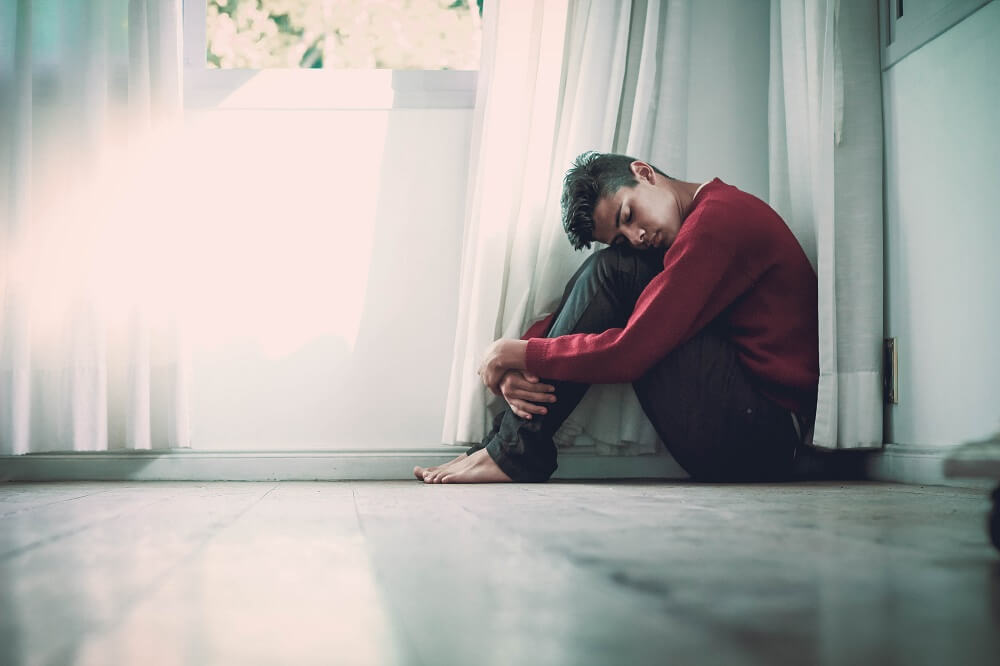It’s important to be able to recognize the signs and symptoms of substance abuse in loved ones. Heroin is one of the most dangerous forms of opioids. It’s made from morphine, but unlike the morphine or fentanyl you get at the hospital, heroin is a street drug. Heroin sold on the street is usually impure and contains any number of toxic chemicals in different combinations.
Heroin is known by several slang terms:
- Junk
- Smack
- Dope
- Black tar
- H
- Snow
It’s often combined with other drugs under other slang terms, such as speedballs (heroin and cocaine).
If you suspect someone you know is using heroin, it’s helpful to know what to look for. The signs of heroin use below are broken into short- and long-term effects.
- Short-term effects include those visible while someone is under the influence or immediately after.
- Long-term signs of heroin use develop after someone has become addicted.

Behavioral Heroin Addiction Symptoms
Many of these signs and symptoms aren’t exclusive to heroin abuse. They may indicate any kind of drug abuse. However, if you notice these in combination with other signs and symptoms here, heroin is likely involved.
Short-term behavioral signs of heroin addiction include:
- Slower movements
- Fatigued appearance—drooping eyelids, yawning
- Sleeping more than usual
- Slurred speech
Long-term behavioral signs of heroin addiction include:
- Withdrawal from family and friends (wanting to spend less time with them)
- Forming new friends, seemingly out of the blue
- Poor performance in school and at work
- Poor hygiene
- Stealing or borrowing money
- Wearing long-sleeved shirts to hide needle track marks
- Lying, evading, or other deceptive behavior
Physical Heroin Addiction Symptoms
The physical effects of heroin use include the signs that heroin is taking its toll on the body. Heroin begins to cause damage immediately after someone first uses it. Some of the physical signs of addiction are known only to the person using heroin. Over time, physical effects will be visible to others and may become obvious.
Short-term physical signs of heroin addiction include:
- Needle tracks, commonly on the arms – Track marks can look like small puncture holes in the skin. If they’re new, they’ll be bright red or pink. If they’re healing, they may be covered by new scar tissue or a scab.
- Pinpoint (small) pupils
- Arms and legs feeling heavy
- Nausea and vomiting
- Constipation
- Shortness of breath
- Dry mouth
- Bone and muscle pain
- Flu-like symptoms (when heroin wears off)
Long-term physical signs of heroin addiction include:
- Frequent illnesses – This happens because heroin decreases the user’s immunity.
- Weight loss
- Loss of menstrual cycle (periods) in women
- Skin infections around injection sites
- Cravings
Mental and Emotional Heroin Addiction Symptoms
Sometimes the mental and emotional effects of heroin quickly cause behavioral changes. Other times, heroin users are very good at hiding how heroin makes them feel. The closer you are to someone who is using heroin, the better you’ll be able to notice subtle changes in their thinking and emotions.
Short-term mental and emotional effects of heroin abuse include:
- Euphoria (intensely pleasurable feelings of excitement and happiness)
- Brain fog (difficulty carrying on a conversation, following simple instructions, or solving basic problems)
- Anxiety (when heroin wears off)
- Fatigue
Long-term mental and emotional effects of heroin abuse include:
- Depression
- Irritability and anger
- Mood swings
- Feeling numb to emotions
The Evidence of Heroin Use
If you suspect your loved one is using heroin, pay close attention to their living space. Their behaviors, combined with lack of normal functioning, are probably affecting their surroundings. There is also likely to be heroin paraphernalia, which may or may not be hidden. Some paraphernalia can seem like normal household items until you look more closely.
Keep an eye out for these signs of heroin abuse in the places where your loved one lives or spends time:
- Needles and/or syringes
- Small plastic baggies with white, black, gray, or brown residue
- Aluminum foil or wrappers with burn marks
- Burned straws
- Burned silver spoons
- Balloons
- Pipes
- Missing valuables
Self-Assessment: Am I Addicted?
"*" indicates required fields
Heroin Withdrawal Symptoms
Addiction happens when the body becomes used to functioning with a substance and depends on it. This is why addiction is also called “chemical dependency.” When a person goes for too long without the drug they’re addicted to, they can become physically sick.
Heroin withdrawal symptoms persist and get more intense until more heroin is taken or the user gets through the withdrawal period. Heroin withdrawal can be deadly. This is why it’s important to go through a medically-supervised detox program.
Below are signs and symptoms heroin withdrawal has begun:
- Intense cravings
- Persistently low mood
- Aggression
- Whole body pain and muscle aches
- Chills
- Increased blood pressure
- Respiratory distress or wet lung (when fluid builds up in the lungs, depriving them of oxygen)
- Insomnia
- Stroke
- Seizures
- Coma
- Death
Don’t Wait Too Long to Seek Help for Heroin Use
Using heroin is extremely dangerous. Nearly 15,000 people died from a heroin-related overdose in 2018. It doesn’t take a lot of heroin to cause an overdose. This is especially true when tolerance has formed. Tolerance is built when you need to take more and more of the drug over time to get the same high. A higher tolerance can mean not noticing when your body has had too much.
If a heroin user builds up tolerance and then stops using the drug for a while, tolerance decreases. Former heroin users can easily overdose if they start abusing heroin again. This is because they often go back to using the same amount they were using before, which their bodies now can’t handle.
There is no safe amount of heroin to use or “recreational” use of heroin. Whether by heroin overdose, withdrawal, or long-term health complication, heroin addiction can be fatal and should never be left unchecked.
There are steps you can take to protect your loved ones, even if you only suspect they use heroin. These precautions include keeping naloxone nearby and knowing how to use it. You should also have knowledge of local resources for heroin addiction recovery.
Heroin abuse treatment comes in different forms, each designed for a different level of need. They are:
If you know someone struggling with heroin addiction, are addicted yourself, or just would like more information, contact Footprints to Recovery treatment center. Calls are free and confidential. We’re happy to help you find the best course of heroin addiction treatment for your or your loved one’s needs.

Questions about treatment options?
Our admissions team is available 24/7 to listen to your story and help you get started with the next steps.


